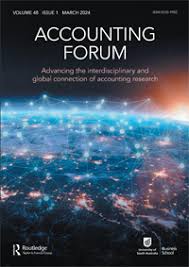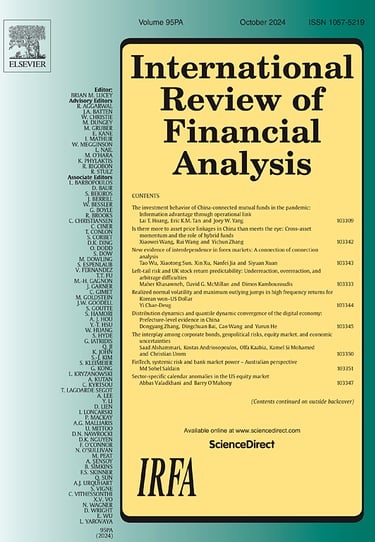Completed Special Issues
Alessi, A., Cojoianu, T.F., Hoepner, A.G.F., Michelon, G. 2024. Special Issue Editorial: Accounting for the EU Green Taxonomy: Exploring its Concept, Data and Analytics. Accounting Forum. 10.1080/01559982.2024.2369343


This Special Forum highlights that accounting for green economic activities is an essential enabler for policymakers, investors, companies, scientists and other stakeholders to gain a nuanced understanding on the most effective ways to transition to a net zero carbon economy in a timely manner. The EU is at the forefront of efforts with legislative developments such as the Taxonomy regulation, the Corporate Sustainability Due Diligence Directive (CSDDD), the Corporate Sustainability Reporting Directive (CSRD), Climate Transition Benchmarks (CTBs), Paris-Aligned Benchmarks (PABs) and the regulation on sustainability-related disclosures in the financial services sector (SFDR). Against this regulatory background, the Special Forum focuses specifically on the EU Taxonomy, a classification system that defines criteria for economic activities that are, in combination with economy wide decarbonization, supportive of a net zero trajectory by 2050 and of meeting broader environmental goals on biodiversity, circular economy, pollution prevention and water.
Alessi, L., Cojoianu, T.F., French, D., Hoepner, A.G.F. 2023. Special issues in support of evidence-based policy making in sustainable banking & finance. International Review of Financial Analysis, 102818. https://doi.org/10.1016/j.irfa.2023.102818


There is little doubt that the sustainable finance policy agenda globally has been spearheaded by the EU Commission, in particular by requiring financial product disclosures on the transparency of the promotion of environmental or social characteristics (Article 8 of the Sustainable Finance Disclosure Regulation - SFDR) or the transparency of sustainable investments in pre-contractual disclosure (Article 9 of SFDR), as well as the transparency of adverse sustainability impacts and their continuous monitoring (Article 4 of SFDR). This self-disclosure regulation has already had a substantial impact on the global financial industry, as it has brought to the surface one of the biggest greenwashing scandals where the large asset manager DWS has had to reduce its claim of assets managed under ESG criteria by over 75%. SFDR deals with three crucial elements: first, it aims to foster transparency through mandatory self-disclosure, secondly, it makes a clear distinction between financial products that merely integrate environmental, social, and governance characteristics in their investment process and those products which actively seek to deliver an impact in the real world. Thirdly, it gives a strong recourse against potential greenwashing as its principal adverse impact indicators will be a key yardstick on whether a financial product achieves its sustainability aims or not, particularly in the context of secondary financial markets. In this light, the special issue seeks to inform policymakers with timely insights on sustainability disclosure, practical ESG integration aspects in investment decision-making, and different aspects of impact investing. Finally, this editorial presents a conceptual framework on how climate change mitigation-related greenwashing could be analyzed.
